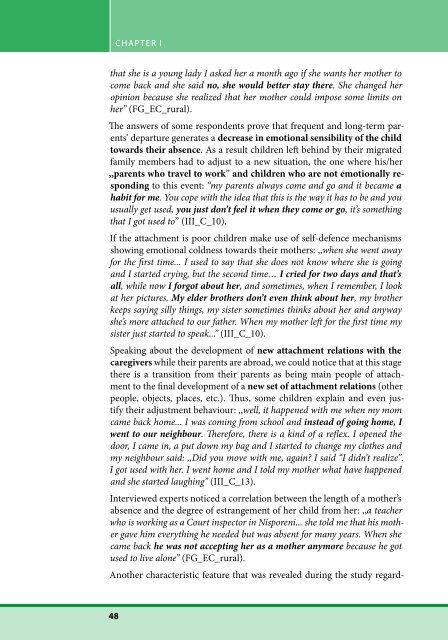specific needs of children and elderly left behind as a ... - IOM Moldova
specific needs of children and elderly left behind as a ... - IOM Moldova
specific needs of children and elderly left behind as a ... - IOM Moldova
You also want an ePaper? Increase the reach of your titles
YUMPU automatically turns print PDFs into web optimized ePapers that Google loves.
CHAPTER I<br />
that she is a young lady I <strong>as</strong>ked her a month ago if she wants her mother to<br />
come back <strong>and</strong> she said no, she would better stay there. She changed her<br />
opinion because she realized that her mother could impose some limits on<br />
her” (FG_EC_rural).<br />
The answers <strong>of</strong> some respondents prove that frequent <strong>and</strong> long-term parents’<br />
departure generates a decre<strong>as</strong>e in emotional sensibility <strong>of</strong> the child<br />
towards their absence. As a result <strong>children</strong> <strong>left</strong> <strong>behind</strong> by their migrated<br />
family members had to adjust to a new situation, the one where his/her<br />
,,parents who travel to work” <strong>and</strong> <strong>children</strong> who are not emotionally responding<br />
to this event: “my parents always come <strong>and</strong> go <strong>and</strong> it became a<br />
habit for me. You cope with the idea that this is the way it h<strong>as</strong> to be <strong>and</strong> you<br />
usually get used, you just don’t feel it when they come or go, it’s something<br />
that I got used to” (III_C_10).<br />
If the attachment is poor <strong>children</strong> make use <strong>of</strong> self-defence mechanisms<br />
showing emotional coldness towards their mothers: ,,when she went away<br />
for the first time... I used to say that she does not know where she is going<br />
<strong>and</strong> I started crying, but the second time… I cried for two days <strong>and</strong> that’s<br />
all, while now I forgot about her, <strong>and</strong> sometimes, when I remember, I look<br />
at her pictures. My elder brothers don’t even think about her, my brother<br />
keeps saying silly things, my sister sometimes thinks about her <strong>and</strong> anyway<br />
she’s more attached to our father. When my mother <strong>left</strong> for the first time my<br />
sister just started to speak...” (III_C_10).<br />
Speaking about the development <strong>of</strong> new attachment relations with the<br />
caregivers while their parents are abroad, we could notice that at this stage<br />
there is a transition from their parents <strong>as</strong> being main people <strong>of</strong> attachment<br />
to the final development <strong>of</strong> a new set <strong>of</strong> attachment relations (other<br />
people, objects, places, etc.). Thus, some <strong>children</strong> explain <strong>and</strong> even justify<br />
their adjustment behaviour: ,,well, it happened with me when my mom<br />
came back home... I w<strong>as</strong> coming from school <strong>and</strong> instead <strong>of</strong> going home, I<br />
went to our neighbour. Therefore, there is a kind <strong>of</strong> a reflex. I opened the<br />
door, I came in, a put down my bag <strong>and</strong> I started to change my clothes <strong>and</strong><br />
my neighbour said: ,,Did you move with me, again? I said “I didn’t realize”.<br />
I got used with her. I went home <strong>and</strong> I told my mother what have happened<br />
<strong>and</strong> she started laughing” (III_C_13).<br />
Interviewed experts noticed a correlation between the length <strong>of</strong> a mother’s<br />
absence <strong>and</strong> the degree <strong>of</strong> estrangement <strong>of</strong> her child from her: ,,a teacher<br />
who is working <strong>as</strong> a Court inspector in Nisporeni... she told me that his mother<br />
gave him everything he needed but w<strong>as</strong> absent for many years. When she<br />
came back he w<strong>as</strong> not accepting her <strong>as</strong> a mother anymore because he got<br />
used to live alone” (FG_EC_rural).<br />
Another characteristic feature that w<strong>as</strong> revealed during the study regard-<br />
48

















